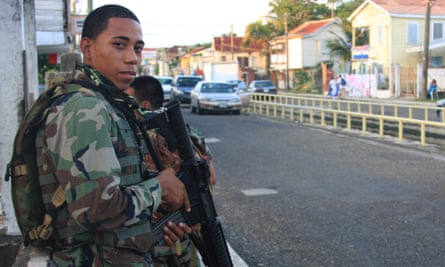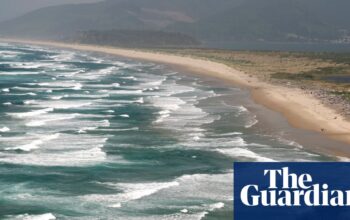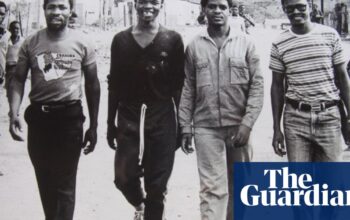A controversial state of emergency in Belize to crack down on a surge of gang-related murders and other violent crimes has led to the arrest of nearly a hundred people.
The order, announced on Tuesday, gives police the power to search homes without a warrant and detain suspects for up to 90 days. Originally implemented for 30 days, the government announced on Friday that it was increasing its length to maximise its effectiveness.
The state of emergency also imposes a nightly curfew on under-18s, who are often groomed by gangs as drug mules.
Located on the coast of Central America, where it shares borders with Mexico and Guatemala, Belize is a member of the Caricom intergovernmental organisation of 20 Caribbean countries, which last year raised alarm about the epidemic of crime and violence in the region.
Caricom leaders have pledged a raft of measures to tackle crime, including a ban on assault weapons, except for security forces and sporting competitions.
The Belize prime minister, Johnny Briceño, said the emergency order would not affect “law-abiding citizens”, telling reporters that the measure was targeted at those creating havoc. He said a 90-day detention “will allow them to calm down” and give police space and time to conduct proper investigations.
But the country’s opposition leader, Moses Barrow, accused the government of having no effective solution to the escalating violence. While there are no official figures on the recent increase in violent crime, Barrow estimated there had been a 45% increase in the murder rate since last year, with 58 murders from January to June this year compared with 40 or 45 in the same period last year.
The recent surge in shootings and murders is largely attributed to territorial disputes among local gangs feuding over control of marijuana markets in the country with a population of about 415,000.

Responding to a question about the parallels with El Salvador’s “iron fist” crackdown on gangs, which saw President Nayib Bukele detain about 2% of the country’s adult population – many with little evidence or access to due process – the Belize police commissioner, Chester Williams, insisted that the measure was necessary to restore law and order.
“You think that Bukele is the most influential world leader for no reason? The state of emergency is something that many countries in the region are looking at because they have seen how effective it has worked in El Salvador, and every government wants their people to be safe,” he told reporters.
Since the state of emergency was implemented on Tuesday, police say they have recovered a number of firearms and arrested people wanted for murder.
But the order has divided public opinion, with some Belizeans condemning the actions of the police and others welcoming the move to “clean up the streets”.
Reacting to local stories about the order one reader wrote: “The police only want the target people kids just because of the area they live and not realizing the trauma they put families through.”
Another said: “I don’t think the police are getting crazy and just will pick up anyone randomly … Allow the police to do their job.”
Monique Teck, whose boyfriend, Kurtis Lamb, was detained, said he was not affiliated with any gangs, adding the police had not provided clear reasons for his detention.
Stephanie Reynolds also demanded justice for her son, Tyreek, 19, who she said had been harassed by officers for months. “My son doesn’t have any criminal record if you go and check his records. He has no criminal record,” she added.
This is Belize’s second state of emergency this year, with the measure seen by authorities as a temporary solution to restoring law and order. In the past, concerns have been raised about the violation of the civil and human rights of those detained under this mechanism.
But Williams said the arrests were backed up by credible intelligence, which ensures the right people are targeted. He told reporters: “As a law enforcement organisation … we have a responsibility to the people, and if we have to implement measures that are going to work for a period of time until we can look at longer lasting measures, then it is going to happen.”
Source: theguardian.com


